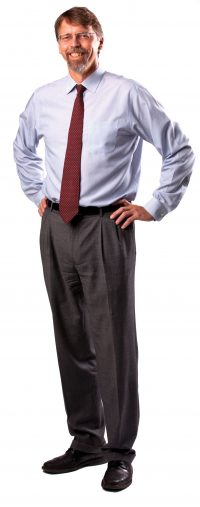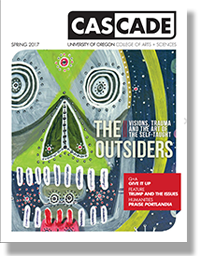A Sea Change for Higher Ed
As I watch the evolving political scene across the nation,
I ponder,  “What does this mean for the College of Arts and Sciences at Oregon?” Everyone agrees that the new national climate heralds a sea change for public higher education.
“What does this mean for the College of Arts and Sciences at Oregon?” Everyone agrees that the new national climate heralds a sea change for public higher education.
On one front, President Trump has called for major cuts to federal research funding, including a 20 percent reduction to National Institutes of Health funding and elimination of the national endowments for the humanities and the arts. These cuts, if enacted, will seriously reduce research funding at the UO that supports salaries for postdocs, graduate and undergraduate students, staff and faculty.
State or federal cuts may also reduce our ability to grant undergraduate scholarships, making it more difficult for Oregon students to attend and complete college. Consider: Although the advertised in-state tuition is $8,910 per year, scholarships help reduce the average net total tuition paid by in-state students to roughly $6,500 per year. Scholarship support makes the UO accessible to students from all financial backgrounds.
Also of concern is the impact of travel restrictions on our 3,000 international students—and on recruitment of new students from overseas. As I write this, our international applications are down 10 percent; some US universities have experienced drops as large as 80 percent. International students enrich our campus through their global perspectives. The revenue from their out-of-state tuition also helps fund in-state students, whose average net tuition covers only about 40 percent of the true cost of their education.
I am also deeply concerned about attacks on our faculty, staff and students. Internet bloggers and media have targeted scholars who study climate change and feminism, spewing commentary that is vicious and factually incorrect. Worse yet are the hate crimes that target minority populations, non-Christian religions and international students. The frequency of these incidents on campus has decreased since the immediate post-election period, but their occurrence has left us wary.
To anticipate and plan for possible repercussions of our changing political climate, I have asked faculty, staff and leadership to engage in “scenario planning.” We will identify the best processes for responding when, for example, our faculty come under factually inaccurate and intimidating attacks launched through the internet and the media. We will ensure that we preserve a financially secure, safe and welcoming environment for all students, faculty and staff.
I find it reassuring that many of our faculty are experts on issues that are in play in these uncertain times. For a deeper understanding of immigration, trade and other concerns, please read the assessments by some of our expert social scientists that appear in this issue.
We live in a time of remarkable change, little of which we can predict with accuracy. As a college, we therefore must remain vigilant in our outlook and flexible in our planning. And, more than ever, we must recommit to our ideals as an institution of public higher education—ideals that require us to seek new knowledge, serve all students and be forward-looking as we train the next generation of leaders.
Andrew Marcus is Tykeson Dean of Arts and Sciences. He is a professor of geography and proud parent of four UO graduates and one current UO student, all in the arts and sciences.
Photo Credit: Kelly James


 Twitter
Twitter Facebook
Facebook Forward
Forward